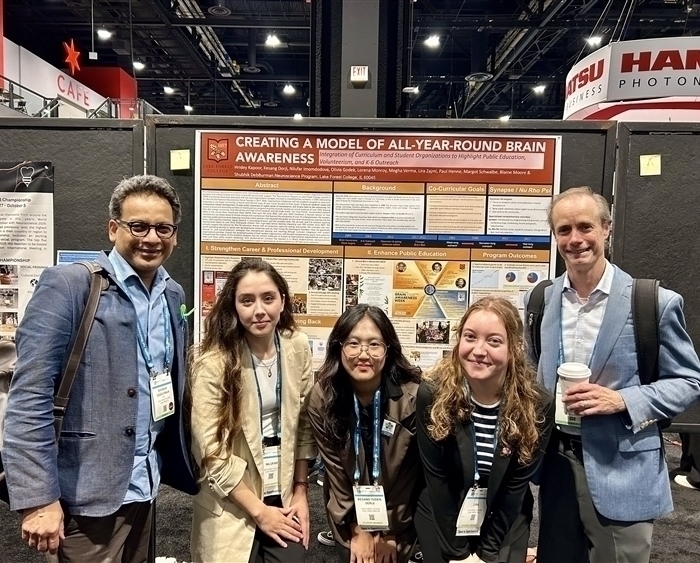Foresters present at international Neuroscience 2024 conference

Sixteen life science students and four faculty members attended the largest brain conference in the world October 5–8 in Chicago.
The annual meeting of the International Society for Neuroscience (SfN), held every five years in the Windy City, offers a deep dive into the latest developments in neuroscience.
This year, 12 students, including two sophomores, had the resume-building opportunity to share with the international crowd the results of the research they conducted on campus or at Rosalind Franklin University of Medicine and Science.
Sebastian Gacek ’25, who won a Nu Rho Psi grant last year to pursue his senior thesis research on Parkinson’s disease, was among the Forester presenters. As he plans for graduate school, Gacek is grateful for the grant and the doors it opened for him, including “getting the opportunity to present my work to others and to know what it’s like being in a large scientific community,” he said.
“It’s really an opportunity to learn from others.” —Sebastian Gacek ’25
Attending Neuroscience 2024 as an undergraduate helped Gacek—and fellow Foresters—become comfortable in the scientific research space. “It’s really an opportunity to learn from others,” Gacek said. “Realizing this made the experience much less stressful and more enjoyable.”
Several student leaders and recent alumni presented teaching and outreach education posters at special science education sessions during this national meeting. These presentations highlighted the College’s neuroscience program’s nationally recognized leadership in fostering collaboration between student organizations and faculty. Together, they create co-curricular programming that emphasizes community education and raises awareness of neuroscience issues.
Students named Bartram Research Scholars
A generous and ongoing gift from Steve and Ann Bartram, long-time supporters and Lake Forest residents, benefits undergraduate neuroscience education, research training, and the professional development of Lake Forest College students. This year’s conference participation was made possible by their support. All students who presented their neuroscience research have been named 2024–25 Bartram Research Scholars:
- Perla Arias ’25 (Senior thesis research poster, Holly Hunsberger RFU Lab)
- Leslie Casares ’25 (Junior year research poster, DebBurman Lab)
- Shanamon Chandavimol ’25 (Richter research poster, DebBurman Lab)
- Kesang Dorji ’25 (Brain awareness/teaching poster as Synapse leader)
- Kate Feist ’25 (Richter research poster, DebBurman Lab)
- Sebastian Gacek ’25 (Senior thesis research poster, DebBurman Lab)
- Nilufar Imomdodova ’25 (Brain awareness/teaching poster as Nu Rho Psi leader)
- Hridey Kapoor ’25 (Brain awareness/teaching poster, as Nu Rho Psi leader)
- Holly Kiernan ’26 (Junior year research poster, DebBurman Lab)
- Daniel Tulchinskiy ’25 (Senior project research poster, Delventhal Lab)
- Megha Verma ’25 (Brain awareness/Teaching poster, as Synapse leader)
- Lira Zajmi ’25 (Brain awareness/Teaching poster, as Synapse leader)
In addition to students, several Lake Forest faculty mentors that worked closely with them also attended Neuroscience 2024. They were: Assistant Professor of Psychology and Neuroscience Hannah Carlson (who also presented the postdoctoral research that she had conducted prior to joining the College), Disque D. and Carol Gram Deane Professor of Biology, Biochemistry and Molecular Biology and Professor of Neuroscience Shubhik DebBurman, Assistant Professor of Biology Rebecca Delventhal, and Professor of Neuroscience D. Blaine Moore. Assistant Professor of Philosophy and Neuroscience Paul Henne ’11 and Assistant Professor of Biology Margot Schwalbe were unable to attend but mentored students on their leadership and community involvement that led to poster presentations.
“Attending SfN allowed our students to share their research, learn about groundbreaking discoveries in neuroscience, and work to expand their professional networks. I couldn’t be prouder of the professionalism and poise with which our students comported themselves,” Moore said.
Among the students who attended were Shrija Chhetri ’24, Jeremy Levin ’25, Lejla Murati ’25, and Michelle Soriano ’24; all have conducted significant research but did not present at this conference.
DebBurman points to Chicago’s easy access as one of the greatest boosts to the College’s curricular strengths.
“Our our life and behavioral science majors expose students early to authentic research experiences that complement the academic course work. Alongside research, we hone strong skills in professional communication that have become one of the strongest assets in our students because of the length and strength of our constant work with them,” he said. “Chicago provides exceptional and frequent opportunities for our students to engage with the larger professional community and practice these skills. The national SfN meeting is perhaps the best of such examples of world-class access.”









